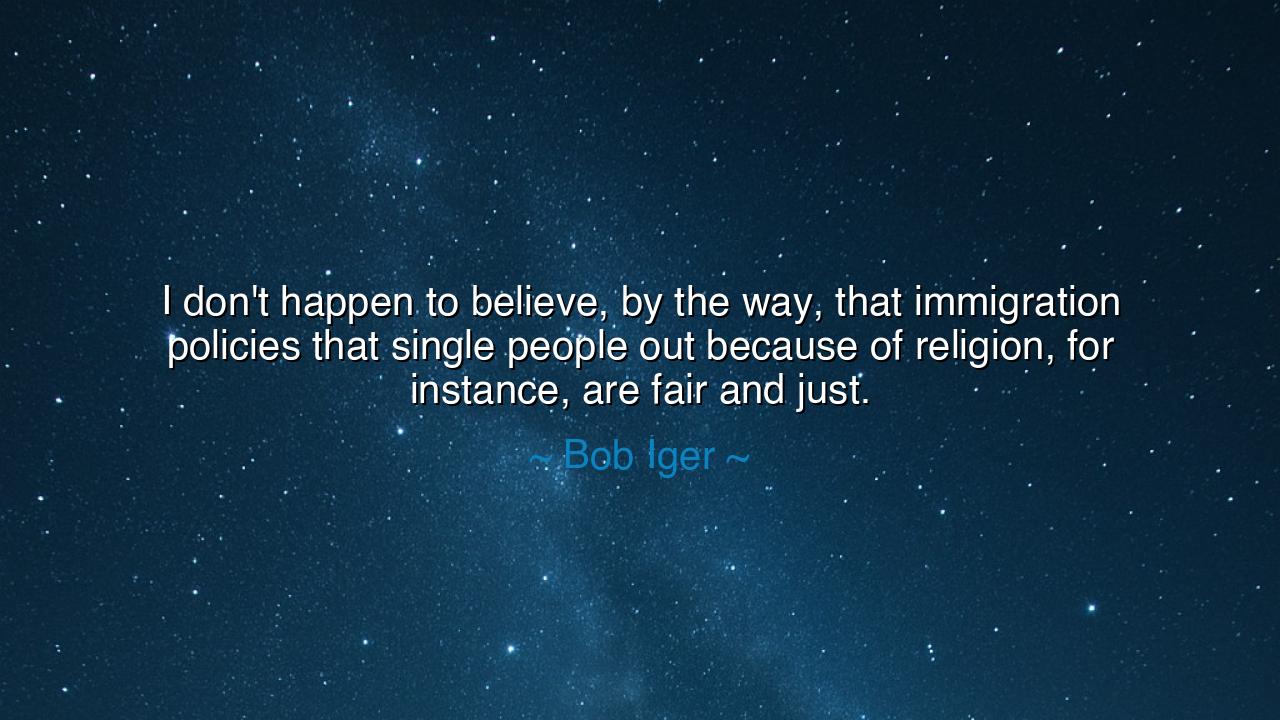
I don't happen to believe, by the way, that immigration policies
I don't happen to believe, by the way, that immigration policies that single people out because of religion, for instance, are fair and just.






When Bob Iger, the visionary leader and storyteller who guided Disney into a new era of creativity and unity, declared, “I don’t happen to believe, by the way, that immigration policies that single people out because of religion, for instance, are fair and just,” he spoke not only as an executive but as a guardian of human dignity. His words shine with the wisdom of one who understands that true greatness — whether in a nation or a company — is built not on exclusion, but on inclusion. In this simple statement lies an ancient truth: that justice cannot wear the mask of prejudice, and that a society divided by creed or race is a house built upon sand.
The origin of this quote can be traced to the years of heated debate over immigration policies in the United States, particularly those that sought to restrict entry based on religious identity. As the head of one of the most influential companies in the world, Iger chose to speak when silence might have been easier. His words were an act of moral courage — a defense of fairness and equality against the tides of fear and division. Like the philosophers of old, he reminded his listeners that power without conscience is hollow, and that leadership must always serve the higher law of humanity.
To single people out because of religion is to forget the very purpose of civilization — which is to rise above the primitive instinct of “us” versus “them.” For centuries, humankind has wrestled with this blindness. The Crusades, the Inquisition, the Holocaust — all were born of the same sin: the belief that faith can divide the worthy from the unworthy. Iger’s words, spoken in a modern age, echo across time as a warning that progress in technology means nothing if we regress in spirit. The true measure of justice, he reminds us, is not in how we treat our own, but in how we welcome the stranger.
History offers us the radiant example of Ellis Island, that gateway of dreams through which millions of immigrants once passed into the promise of America. They came from every land and every faith — Jews fleeing persecution, Catholics escaping famine, Muslims seeking peace, and Protestants yearning for freedom. Together they built a nation whose strength lay not in uniformity, but in diversity. Each language, each custom, each prayer became a note in the symphony of a new world. To exclude based on religion would be to silence that music, to deny the very melody that gave the nation its soul.
Yet the temptation to discriminate has always walked beside power. In the shadows of fear, men forget their own history. They build walls where they should build bridges. They forget that justice is not a gift for the few, but a duty owed to all. Iger’s stance is not political — it is ethical, drawn from the well of universal wisdom that flows through every age: that to judge a person by their belief is to blind oneself to the divine spark that resides in every heart. The true religion of mankind, if there is one, is compassion — and it requires no border or passport.
Consider the story of Raoul Wallenberg, a Swedish diplomat during the Second World War, who risked his life to save tens of thousands of Jews from Nazi persecution. He did not ask what faith they followed; he saw only their humanity. His courage stands as a monument to the idea that morality transcends identity. What Iger expressed, in the context of immigration, is this same eternal truth: that human worth cannot be measured by creed, and that any policy built upon exclusion dishonors the dignity of man.
The lesson here is clear: fairness is not merely a law written in books — it is a light carried in the heart. When we allow fear to determine who is welcome and who is cast aside, we diminish our own freedom. Each act of empathy, each defense of another’s right to belong, strengthens the foundation of a just society. Let no religion, race, or origin divide what humanity and hope have joined.
And so, as the ancients would counsel: be a guardian of fairness in your own sphere. When you see others singled out, speak with courage. When you lead, lead with mercy. For in the end, as Bob Iger reminds us, the greatness of any nation or people is not measured by whom it keeps out, but by how it opens its arms. A heart that welcomes all faiths, all voices, all dreams — that is the true temple of justice, and from it the light of peace will forever shine.






AAdministratorAdministrator
Welcome, honored guests. Please leave a comment, we will respond soon